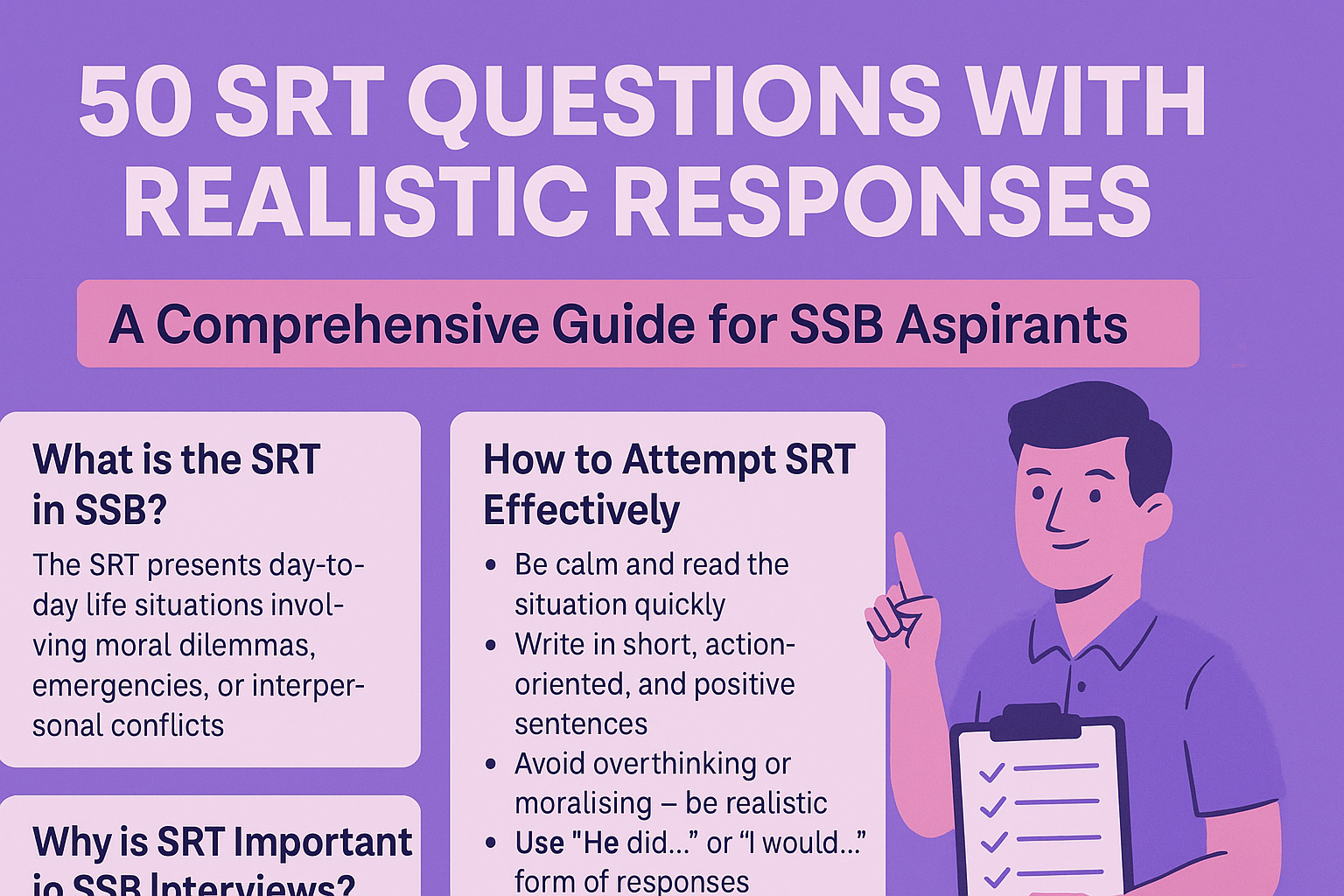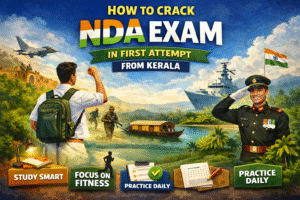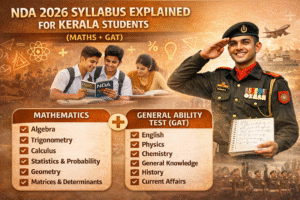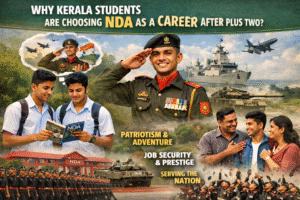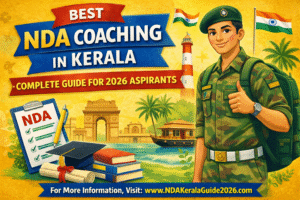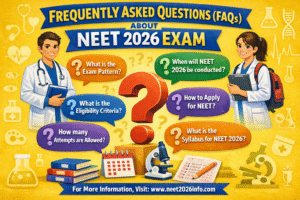The Situation Reaction Test (SRT) is a key psychological assessment in the SSB (Services Selection Board) interview process. It evaluates a candidate’s mindset, decision-making ability, problem-solving skills, and officer-like qualities (OLQs) under pressure. This test is part of the Psychological Test Battery and consists of 60 situations to be solved in 30 minutes. Hence, practice and clarity of thought are crucial.
In this article, we provide 50 realistic SRT questions along with model responses to help candidates understand how to approach various scenarios confidently.
What is the SRT in SSB?
The SRT presents day-to-day life situations involving moral dilemmas, emergencies, or interpersonal conflicts. The candidate is required to write how they would react in each situation, showcasing practical and decisive thinking within a limited time frame.
Why is SRT Important in SSB Interviews?
Tests presence of mind
Evaluates decision-making under stress
Reveals leadership and emotional intelligence
Gauges the candidate’s values and OLQs
Assesses initiative, responsibility, and mental resilience
How to Attempt SRT Effectively?
Be calm and read the situation quickly
Write in short, action-oriented, and positive sentences
Avoid overthinking or moralising – be realistic
Use “He did…” or “I would…” form of responses
Practice time management (30 seconds per question)
50 SRT Questions with Realistic Responses
| SRT Situation | Suggested Response |
|---|---|
| Your friend is cheating in an exam. | He warns him and asks him to stop immediately. |
| You missed your train and have no money. | He contacts family/friends and informs station authorities. |
| You see a road accident on the way to an interview. | He calls for an ambulance and helps the victim, then informs the interviewer. |
| Your teammate is not cooperating. | He speaks to him calmly and ensures coordination. |
| You are not selected for the final team. | He accepts it and works harder for next time. |
| Fire breaks out in your hostel. | He alerts everyone and calls fire services. |
| You forgot your ID before a crucial test. | He explains the situation to the authority and arranges a digital copy. |
| You are running late for an important meeting. | He calls and informs, then takes the quickest route. |
| You find a wallet on the road. | He submits it to the police. |
| You are lost in a forest. | He stays calm, finds direction, and searches for help. |
| Your friend wants to commit suicide. | He counsels him, involves family and arranges professional help. |
| You see your senior bullying a junior. | He intervenes respectfully and reports it to concerned authority. |
| Your mobile phone is stolen. | He reports it and blocks access through service provider. |
| A family member falls sick at night. | He gives first aid and rushes them to hospital. |
| Your bicycle tire is punctured during an exam day. | He hires alternative transport and reaches on time. |
| You fail in an important subject. | He analyses the reason and improves his preparation. |
| Someone falsely accuses you of cheating. | He explains calmly and provides evidence to prove innocence. |
| You are offered a bribe. | He refuses and reports the person to the authority. |
| Your friend asks you to lie for him. | He refuses and advises him to speak the truth. |
| A stranger asks for your phone to make a call. | He helps after assessing the safety of the situation. |
| A snake is found in the classroom. | He calms everyone and calls the forest helpline. |
| You see someone stealing in the market. | He informs shopkeeper/security discreetly. |
| You are stuck in a lift. | He presses emergency button and stays calm. |
| You find a fellow cadet unconscious. | He checks for response and arranges immediate medical help. |
| You are selected but your parents disapprove. | He respectfully convinces them with logic and passion. |
| Your team loses because of your mistake. | He apologizes and takes responsibility. |
| You are wrongly punished. | He accepts it calmly and explains facts later. |
| You see a child begging on the street. | He contacts a child helpline or NGO. |
| There is a leak in your house water tank. | He informs family and calls plumber immediately. |
| You see smoke coming from a neighbor’s house. | He knocks and calls emergency service. |
| You miss your study schedule. | He adjusts and makes up next day. |
| You’re stuck in a traffic jam en route to SSB. | He informs reporting officer and stays calm. |
| You lost your documents before SSB. | He files a report and arranges duplicates. |
| A stranger is stalking your friend. | He advises her to report and accompanies her. |
| Your friend failed SSB and is demotivated. | He motivates him and helps plan the next attempt. |
| You are injured in the playground. | He applies first-aid and informs authority. |
| You are low on confidence before an exam. | He revises key points and boosts morale. |
| You are not able to answer during a group task. | He listens and contributes when confident. |
| You are blamed for a team failure. | He explains facts politely and supports the team. |
| You forget your friend’s birthday. | He apologizes and makes it up later. |
| You see a junior crying. | He comforts and listens, then guides them. |
| You face gender bias in your workplace. | He reports through proper channel and handles maturely. |
| You are mocked for your accent. | He ignores and continues working on self-improvement. |
| You find a leak of confidential data. | He reports immediately to the higher authority. |
| You see an animal in pain. | He rescues and informs animal care services. |
| You failed in your first SSB attempt. | He learns from mistakes and prepares again. |
| You are offered alcohol during duty hours. | He refuses firmly and reports it. |
| You are home alone and someone knocks suspiciously. | He verifies through peephole and informs police if needed. |
| You find your name missing from merit list. | He verifies, raises query if needed, and prepares again. |
| A friend is constantly disturbing your preparation. | He speaks politely and sets boundaries. |
Tips for Practicing SRT
Practice 15–20 SRTs daily in timed settings
Prioritize clarity over lengthy writing
Focus on values: honesty, leadership, responsibility, initiative, discipline
Review OLQs and align your responses with them
Frequently Asked Questions (FAQs)
Q1. How many SRT questions are asked in the SSB interview?
You are given 60 SRT questions to solve in 30 minutes.
Q2. What is the ideal length of an SRT response?
A one-line action-oriented answer is ideal. Keep it short and impactful.
Q3. Should responses be in first person or third person?
Prefer writing in third person like “He did…” or “He handled…”.
Q4. Can I prepare SRT responses in advance?
No. It’s about spontaneous thinking. Preparing beforehand may make your answers look artificial.
Q5. What if I attempt fewer than 60 SRTs?
It’s okay. Quality matters more than quantity, but aim for at least 45+ with genuine responses.

